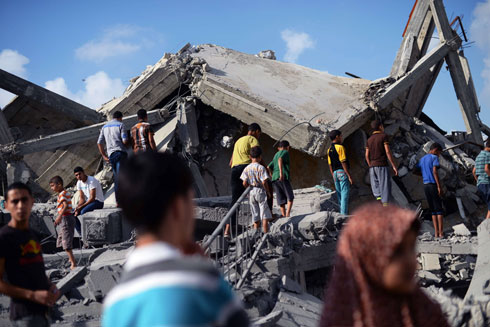
An incrimental Gaza ceasefire
The latest agreement to be signed by Israel and Hamas involves a month-long ceasefire, no gains for Hamas, but plenty for Israel to be happy about.
This "minor agreement" came about after both sides and Egypt recognized that a full agreement could not be reached – because of differences of opinion over the security arrangements demanded by Israel and Hamas' request to lift the siege – and due to the breakthrough achieved in Cairo Monday night that led to an agreement to extend the ceasefire for yet another day.
Agreement, explained
A ceasefire of at least one month. As part of that ceasefire, Hamas will undertake not to launch rockets, mortars or anti-tank missiles, or carry out any military operations, including attacks on the border fence, attacks on IDF patrols, digging terrorist tunnels and marine or aerial assaults.
For its part, the IDF will undertake not to attack Gaza, halt targeted killings (even against senior Hamas officials) and to refrain from operating west of the border fence in the security perimeter - a designated area inside the Gaza Strip that Israel implemented after Operation Pillar of Defense in November 2012.
Israel will allow humanitarian aid to enter the Gaza Strip from its territory, including food, medicine, clothing, blankets and raw materials for the production of essential consumer goods. Tents, mobile homes, ovens and other materials will also be transferred, to assist the Gaza residents whose homes have been destroyed.
Israel agreed to a Turkish proposal for the transfer of portable structures to the Strip. Turkey initially suggested 3,000 houses, but for now the proposal covers the transfer of 1,000 such buildings. Ankara has made similar proposals in the past, and Israel offered Turkey mobile homes during the massive earthquake several years ago. Turkey is also taking in wounded Gazans.
Israel is steadfast in its insistence that humanitarian aid is delivered solely to the representatives of international organizations in the Gaza Strip. These organizations will monitor distribution in order to prevent the transfer of dual use (military and civilian) materials to the armed wings of Hamas and Islamic Jihad. This will fulfill Israel's demand that Hamas and Jihad cannot be built up again.
Meanwhile, the Rafah crossing between Gaza and Egypt will remain closed, or near closed, even though this is not clearly stated in the agreement.
All of the "heavy" issues, such as the fundamental reconstruction of the Gaza Strip, the exchange of bodies, the release of Palestinian prisoners, and the Israeli demand for Gaza demilitarization will be left to the negotiations in Cairo, which will continue throughout the extended ceasefire.
The Palestinian Authority will oversee the passage of aid from Israel into the Gaza Strip, and also allow the transfer of salaries to Hamas civil servant, which will be paid by foreign donors, primarily Qatar.
The minor agreement means that Israel has accepted a durable ceasefire, at least for a period of one month, allowing residents to return to their homes in the western Negev, start the school year, and maybe even spend the upcoming Jewish holidays in peace. Hamas did not get even one of its demands in return for a long-term ceasefire on its part.
But Gaza's citizens, especially those whose homes were destroyed, will receive emergency aid, and will also be able to prepare for a winter in temporary housing. Given the situation, Hamas and the other factions thought twice and even three times about whether they really wanted to start fighting again, and further antagonize the local population.
Hamas out of loop
This is purely an emergency humanitarian and rehabilitation aid delivery, for which Israel will have details of every item. This is not the massive aid package to rebuild the Gaza Strip that Hamas so desperately needs to placate the citizens of Gaza. Nor is it aid that will allow the military wings of Hamas and Islamic Jihad to restore themselves. Furthermore, it was also agreed that Rafah will remain closed and the Egyptian army will continue to destroy smuggling tunnels into Gaza from its territory.
These facts are won’t be found in the minor agreement document, but there is a tacit Israel-Egyptian understanding in place. This initial agreement does not allow Hamas to present any great achievement, but does allows Israel to show goodwill in the eyes of Egypt and the international community, as well as to mobilize support and legitimacy for continued negotiations, which could well be difficult and may even involve renewed fighting.
What Hamas did secure were various economic benefits, which that Israel was willing to give even before Operation Protective Edge. In general, one can say that Israel has not yet allowed Hamas any real achievement while safeguarding its own most vital interests, primarily preventing the restoration of the Islamist groups' military capabilities.
To Israel, the greatest drawback is that a month-long ceasefire translates to the release of IDF reservists, and a certain amount of uncertainty among the residents of the western Negev.
In such a situation, it would be difficult for Israel, as well as Hamas, to resume fighting should the negotiations not go as planned. Meanwhile, Israelis living in the shadow of Gaza will again bear the brunt of an uncertain existence for a certain period of time.











